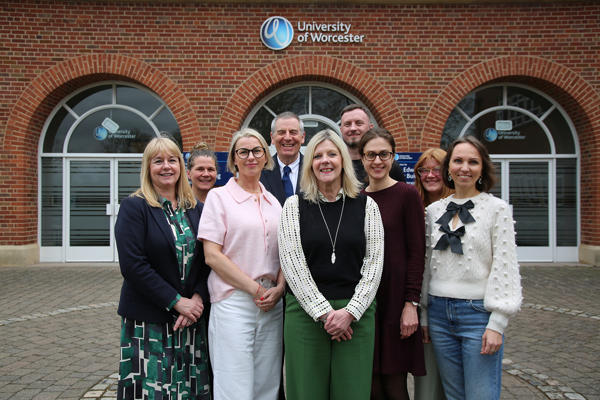Senior representatives from the only dedicated sports university in Lithuania have visited the University of Worcester to get insights into its sports provision.
 Staff from Lithuanian Sports University with staff from the University of Worcester during their visit
Staff from Lithuanian Sports University with staff from the University of Worcester during their visit
The visitors from Lithuanian Sports University were particularly interested to find out how the University of Worcester manages elite athlete students through its Sports Scholarship programme and more about the Sports Therapy clinic, which offers practical sessions for students on real-life clients.
Delina Neidorf, Head of Study Department at Lithuanian Sports University, said: "It’s always beneficial to examine how other universities are addressing similar challenges. For instance, many institutions face issues related to the study process, particularly for athletes who need to attend training camps and competitions while still fulfilling their academic requirements. We might discover new ideas we can implement by looking at what other universities are doing.
“It’s fascinating to learn about the different strategies the University of Worcester has adopted to manage this situation. As a sports university, we aim to attract and retain athletes, as we want to be their first choice. Therefore, discussing approaches here at Worcester has been very helpful.”
The visitors sat in on some lectures, including one with the University’s Sports Scholarship students, and spoke to staff that manage these elite level athlete students. They also got to see a Sports Therapy theory to practical session and one of the Sports Therapy clinics in action.
They wanted to find out more about the Sports Therapy clinic in particular, which is open to both the University and wider community to make use of, with a view to offering something similar initially open to student athletes. The University of Worcester’s clinic focuses on the prevention of injury and the rehabilitation of clients, and sees Sports Therapy students work with the public all the way to high level athletes under supervision of University staff.
Edgaras Lapinskas, Director of the Physiotherapy Study Programme at Lithuanian Sports University, said: “We’re learning to establish the same. We’re here to explore how you are running these clinics, what equipment you have, what’s the management of this clinic and how to attract other athletes to use these facilities.”
Ms Neidorf said they not only want to provide athlete rehabilitation for their physiotherapy students, but they were also thinking about offering a service open to the public in the future, as Worcester currently offers.
She praised what she had seen on touring the campuses. “It’s a lovely place to study because you have very beautiful campuses,” she said. “If I would be a student I would be lucky to stay here because the auditoriums are very nice - very spacious and bright. The cafeteria, coffee shops, places to read or study outside for students, it’s very impressive, and the place [Worcester] is very beautiful.”